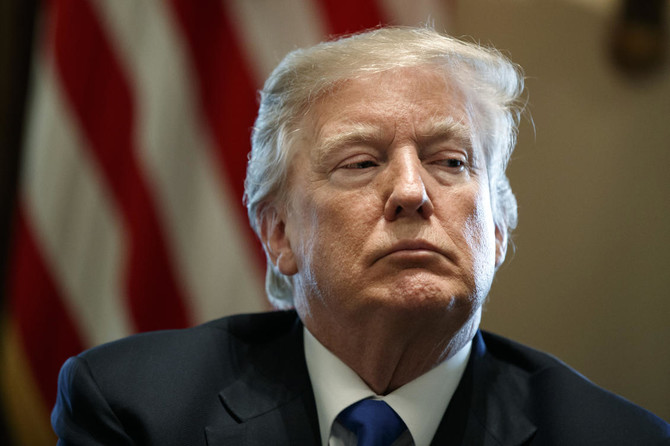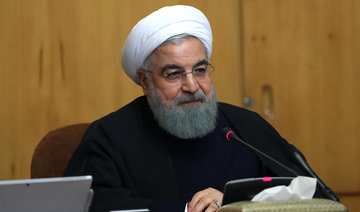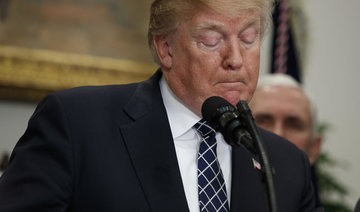MOSCOW: Iran said on Saturday it would retaliate against new sanctions imposed by the United States after President Donald Trump set an ultimatum to fix “disastrous flaws” in a deal curbing Tehran’s nuclear program.
Trump said on Friday he would waive nuclear sanctions on Iran for the last time to give the United States and European allies a final chance to amend the pact. Washington also imposed sanctions on the head of Iran’s judiciary and others.
Russia — one of the parties to the Iran pact alongside the United States, China, France, Britain, Germany and the European Union — called Trump’s comments “extremely negative.”
The ultimatum puts pressure on Europeans, key backers of the 2015 nuclear deal, to satisfy Trump, who wants the pact strengthened with a separate agreement within 120 days.
While approving the waiver on US sanctions related to the nuclear deal, Washington announced other sanctions against 14 Iranian entities and people, including judiciary head Ayatollah Sadeq Larijani, a close ally of Iran’s Supreme Leader Ayatollah Ali Khamenei.
Describing sanctions against Larijani as “hostile action,” Iran’s Foreign Ministry said the move “crossed all red lines of conduct in the international community and is a violation of international law and will surely be answered by a serious reaction of the Islamic Republic,” state media reported.
It did not specify what any retaliation might involve.
Iran’s Foreign Minister Mohammad Javad Zarif had earlier said on Twitter that the deal was “not renegotiable” and that Trump’s move “amounts to desperate attempts to undermine a solid multilateral agreement.”
Iran says its nuclear program has only peaceful aims and says it will stick to the accord as long as others respect it. But it has said it would “shred” the deal if Washington quit.
“LAST CHANCE“
Trump, who has sharply criticized the deal reached in Barack Obama’s presidency, had chafed at having to once again waive sanctions on a country he sees as a threat in the Middle East.
“Despite my strong inclination, I have not yet withdrawn the United States from the Iran nuclear deal,” Trump said in a statement, saying the options were to fix “the deal’s disastrous flaws, or the United States will withdraw.”
“This is a last chance,” Trump said, pushing for a separate agreement and saying the United States would not waive sanctions again to keep Iran in the pact without such an agreement.
Russian Deputy Foreign Minister Sergei Ryabkov called Trump’s remarks “extremely negative,” RIA state news agency reported. “Our worst fears are being confirmed,” he said.
The EU said in a statement it had taken note of Trump’s decision and would assess its implications. “It’s going to be complicated to save the deal after this,” said one European diplomat, speaking on condition of anonymity.
Britain, France and Germany had called on Trump on Thursday to uphold the pact.
Senior US administration officials told reporters Trump would work with Europeans on a follow-on deal to enshrine triggers that the Iranian government could not exceed related to ballistic missiles.
Republican Senator Bob Corker said “significant progress” had been made on bipartisan congressional legislation to address “flaws in the agreement without violating US commitments.”
CONDITIONS
Trump laid out conditions to keep Washington in the deal. Iran must allow “immediate inspections at all sites requested by international inspectors,” he said, and “sunset” provisions imposing limits on Iran’s nuclear program must not expire.
Trump said US law must tie long-range missile and nuclear weapons programs together, making any missile testing by Iran subject to “severe sanctions.”
The president wants US Congress to modify a law that reviews US participation in the nuclear deal to include “trigger points” that, if violated, would lead to the United States reimposing its sanctions, the official said.
This would not entail negotiations with Iran but would be the result of talks with European allies, the official said.
A decision to withhold a waiver would have effectively ended the deal between Iran and the other international signatories. The other parties to the agreement would have been unlikely to join the United States in reimposing sanctions.
Two EU diplomats said EU foreign ministers would discuss next steps at their next regular meeting on Jan. 22 in Brussels.
US ultimatum on nuclear deal, new sanctions draw Iran threat
US ultimatum on nuclear deal, new sanctions draw Iran threat

Iraq ministry says two border guards killed by PKK fire
The two guards were killed and a third wounded
IRBIL, Iraq: A shooting which officials blamed on the Kurdistan Workers’ Party (PKK) killed two Iraqi border guards on Friday near the Turkish boundary in Iraq’s autonomous Kurdish region, Iraq’s interior ministry said.
The PKK, which has fought a decades-long insurgency against the Turkish state, has several positions in Iraq’s northern Kurdistan region, which also hosts Turkish military bases used to strike Kurdish insurgents.
“When the Iraqi border forces were carrying out their duties securing the Iraqi-Turkish border... they were fired at by terrorists from the banned PKK organization” in Zakho district, the interior ministry said in a statement.
The two guards were killed and a third wounded, it added.
A border guard official told AFP that the guards were patrolling a village near the Turkish border when the “shooting and clashes” with the PKK took place.
Baghdad deploys federal guards along its border with Turkiye in coordination with the government of the Kurdistan region and its forces, the peshmerga.
The Iraqi federal authorities in Baghdad have recently sharpened their tone against the PKK. Last year, Baghdad quietly listed the group as a “banned organization” — though Ankara demands that the Iraqi government do more in the fight against the militant group.
Ankara along with the United States deems the PKK a “terrorist” organization.
Türkiye has conducted hundreds of strikes against PKK fighters in Iraq’s autonomous Kurdistan region.
Israeli withdrawal from south Lebanon will last beyond 60 days, Netanyahu’s office says

- There was no immediate comment from Lebanon or Hezbollah
JERUSALEM: The Israeli army will not complete its withdrawal from southern Lebanon by a Monday deadline, Prime Minister Benjamin Netanyahu’s office said on Friday, saying Lebanon has not yet fully enforced the ceasefire agreement.
The deal, brokered by the United States and France, ended more than a year of hostilities between Israel and the Iran-backed Hezbollah. The fighting peaked with a major Israeli offensive that displaced more than 1.2 million people in Lebanon and left Hezbollah severely weakened.
Under the agreement, which came into effect on Nov. 27, Hezbollah weapons and fighters must be removed from areas south of the Litani river and Israeli troops should withdraw as the Lebanese military deploys into the region, all within a 60-day timeframe due to conclude on Monday at 4 a.m. (0200 GMT).
Netanyahu’s office said in a statement that the Israeli military’s withdrawal process was “contingent on the Lebanese army deploying in southern Lebanon and fully and effectively enforcing the agreement, while Hezbollah withdraws beyond the Litani.”
“Since the ceasefire agreement has not yet been fully enforced by the Lebanese state, the gradual withdrawal process will continue, in full coordination with the United States,” the statement said.
There was no immediate comment from Lebanon or Hezbollah.
UN suspends all trips into Houthi-held areas of Yemen over staffers being detained

- The statement comes after the Houthis detained UN staffers
DUBAI: The United Nations on Friday suspended all travel into areas held by Yemen’s Houthi rebels after more of their staff were detained by the rebels.
The statement comes after the Houthis detained UN staffers, as well as individuals associated with the once-open US Embassy in Sanaa and aid groups.
“Yesterday, the de facto authorities in Sanaa detained additional UN personnel working in areas under their control,” the UN statement read. “To ensure the security and safety of all its staff, the United Nations has suspended all official movements into and within areas under the de facto authorities’ control.”
The Houthis did not immediately acknowledge the UN’s decision, which came as they have been trying to deescalate their attacks on shipping and Israel after a ceasefire was reached in the Israel-Hamas war.
US President Donald Trump separately has moved to reinstate a terrorism designation he made on the group late in his first term that had been revoked by President Joe Biden, potentially setting the stage for new tensions with the rebels.
The Houthis earlier this week said they would limit their attacks on ships in the Red Sea corridor and released the 25-member crew of the Galaxy Leader, a ship they seized back in November 2023.
Israel building military installations in Golan demilitarized zone

- UN: Israeli construction along Area of Separation is ‘severe violation’ of 1974 ceasefire agreement
- Israeli forces have been operating in southern Syria since fall of Assad regime in December
LONDON: The Israeli military is building installations in the demilitarized zone between the occupied Golan Heights and Syria, satellite images published by the BBC have revealed.
Israeli forces moved into the Area of Separation agreed in the 1974 ceasefire with Syria, crossing the so-called Alpha Line following the fall of the Assad regime in December.
The satellite images, taken on Tuesday, show construction work and trucks around 600 meters inside the Area of Separation, including a track linking the site to another Israeli-administered road in the area.
Footage obtained by a drone operated by a Syrian journalist on Monday also identified excavators and bulldozers at the location.
The Israeli military told the BBC that its “forces are operating in southern Syria, within the buffer zone and at strategic points, to protect the residents of northern Israel.”
The UN Disengagement Observer Force has said Israeli construction along the Area of Separation is “a severe violation” of the 1974 ceasefire agreement.
Jeremy Binnie, Middle East specialist at defense intelligence company Janes, told the BBC: “The photo shows what appear to be four prefabricated guard posts that they will presumably crane into position in the corners, so this is somewhere they are planning to maintain at least an interim presence.”
It is not the first time that the BBC has identified Israeli forces inside the Area of Separation. Soldiers were spotted near the town of Majdal Shams, around 5.5 km from the new site, while satellite pictures taken in November found a trench being dug by Israeli personnel along the Alpha Line near the town of Jubata Al-Khashab.
Hamas says to provide names of 4 Israeli hostages on Friday for next swap

- Four Israeli women hostages to be freed on Saturday as part of a second release
- Hamas has not released definitive information on how many captives are still alive or the names of those who have died
CAIRO: A senior Hamas official told AFP that his group will provide on Friday the names of four Israeli women hostages to be freed the following day as part of a second release under the ceasefire with Israel.
“Today, Hamas will provide the names of four hostages as part of the second prisoner exchange,” said Bassem Naim, a member of Hamas’s political bureau based in Doha.
“Tomorrow, Saturday, the four women hostages will be released in exchange for a group of Palestinian prisoners, as agreed upon in the ceasefire deal.”
Naim also said that once the exchange takes place, war-displaced Palestinians in southern Gaza will be able to begin returning to the north of the territory.
“An Egyptian-Qatari committee will oversee the implementation of this part of the agreement on the ground,” he said.
“The displaced will return from the south to the north via Al-Rashid Road, as Israeli forces are expected to withdraw from there in accordance with the agreement.”
The ceasefire agreement was brokered by Qatar, Egypt and the United States after months of intense negotiations.
The truce, the second in the more than 15 months of war, began on Sunday, with the first three hostages released in exchange for around 90 Palestinian prisoners.
The war between Hamas and Israel broke out after the militants’ deadly attack on Israel on October 7, 2023.
During the attack, militants took 251 hostages, 91 of whom remain in Gaza, including 34 the Israeli military has confirmed are deceased.
The first truce, implemented in late November 2023, lasted just one week but involved the release of 105 hostages in exchange for 240 Palestinian prisoners.
The October 7 attack resulted in the deaths of 1,210 people on the Israeli side, mostly civilians, according to an AFP tally based on official Israeli figures.
Since then, Israel’s retaliatory response has killed at least 47,283 people in Gaza, the majority of them civilians, according to the Hamas-run territory’s health ministry, figures which the UN considers are reliable.



















